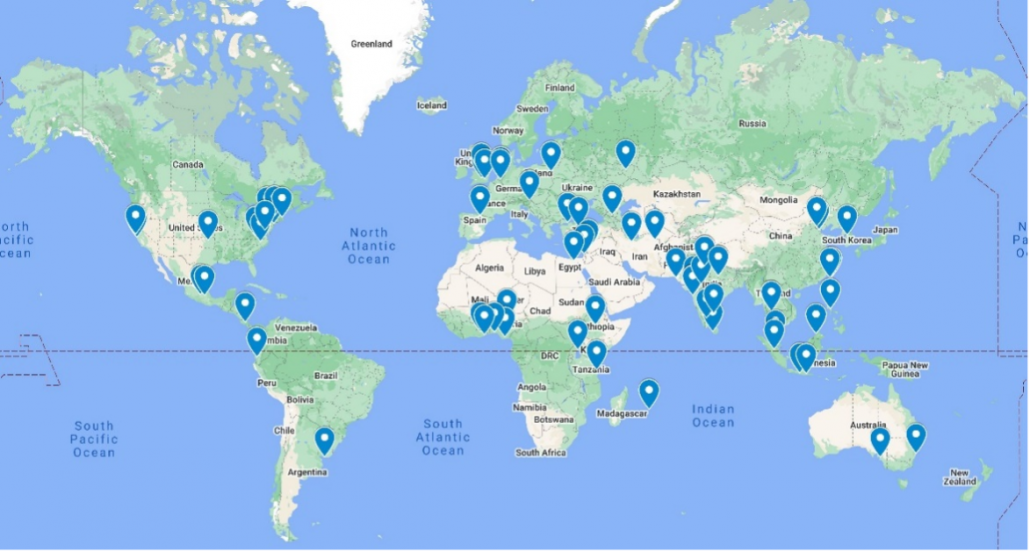January 26th, 2022
Stanford Center on Longevity Announces Finalists for 9th Annual Design Challenge
“Longevity-Ready Environments: Rethinking Physical Spaces for Century-Long Lives”
The Stanford Center on Longevity is pleased to announce eight Finalist teams for the 2022 Longevity Design Challenge. These Finalists were selected from 124 submissions received from 33 different countries. The Challenge, now in its ninth year, is open to teams from any accredited university in the world.

Map of Stanford Center on Longevity Design Challenge 2021-2022 Submissions
The goal of the Challenge is to encourage student designers to innovate for our increasingly longer lives. The 2022 challenge to design for “Longevity-Ready Environments” was inspired by the New Map of Life initiative, which seeks to build a society that better supports century-long lives. In a paper recently published in Nature Aging, New Map of Life Fellows Chenghao Wang and Diego Sierra Huertas, along with their collaborators including SCL Founding Director Laura Carstensen, expand on the idea of age-friendly cities to be inclusive of all stages of life, as many environmental impacts on health accumulate over decades.
“Our physical environment – including both the climate and the built environment – has a profound impact on physical and mental well-being, from birth through old age,” commented Marie Conley Smith, who coordinates the Challenge. “It’s exciting to see all the different aspects of the environment that the Finalists’ innovations target, and I look forward to their development over the next couple of months.”
Finalists were selected by a panel of 30 expert judges drawn from industry, academia, and non-profit foundations. Teams will be awarded $1,000 to develop their designs further and will compete for a $10,000 first prize in the finals, which will be held online from March 29 – April 6, 2022.
This year’s finalists are (in alphabetical order):
Karpolax (Makere University, Uganda) – A sachet using green nanotechnology to extend the shelf life of fruit.
Leafin (Universitas Gadjah Mada, Indonesia) – An aeroponic gardening assistant using mobile app-based features and an IoT-integrated planting kit.
Neem extracts natural insecticide (Kwame Nkrumah University of Science and Technology, Ghana) – A natural insecticide to improve crop outcomes without adverse environmental effects.
The Sarewa (Ahmadu Bello University, Nigeria) – A modified streetlight that connects passengers to rides without a smart phone.
Shelco (University of the Arts, United Kingdom) – A dust-capturing modular system for stable, aesthetic, and affordable roofs.
Smultronställe (University of Science Malaysia, Malaysia) – A detachable vertical farming system for urban farming.
Spore (North Carolina State University, USA) – A device that detects mold spores in the air.
Tlekuilli (Universidad Autónoma del Etado de Mexico, Mexico) – A stove made from recycled, local materials that reduces smoke exposure for users.
About the Challenge
The Stanford Center on Longevity Design Challenge is a global competition aimed at encouraging students to design products and services to improve the lives of people across all ages. Established in 2013, the Challenge is focused on ways to motivate and empower people in their daily lives both inside their homes and in their community.
The challenge is made possible by generous sponsorship from a number of companies and foundations, including, Target, Honda Motor Company, Finance of America Reverse, Procter and Gamble, and Eskaton.
